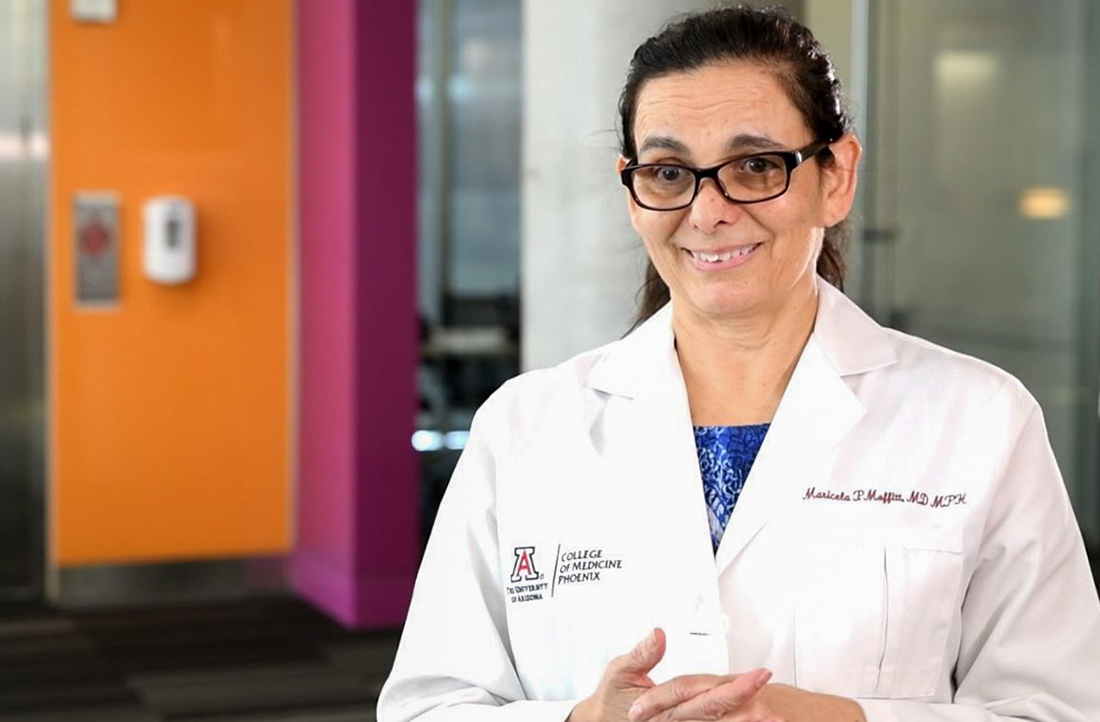
Physician Receives Prestigious Award for Being an Outstanding Educator

In addition to treating patients, Maricela Moffitt, MD, MPH, wanted to change the world by educating the next generation of physicians.
For more than 30 years, she has stuck with that vision by teaching medical students and residents across Arizona. Dr. Moffitt, director of the Doctoring Course and professor of Internal Medicine at the University of Arizona College of Medicine – Phoenix, has continuously demonstrated passion and commitment to ensuring medical students are prepared in their future careers as physicians.
On May 11, during the college’s virtual graduation ceremony, Dr. Moffitt was awarded the Stuart D. Flynn, MD, Master Educator teaching excellence award, which recognizes extraordinary accomplishments in all aspects of education over all four years of medical school. This is her fourth time receiving the award, which is given by the fourth-year medical students.

During the selection process, one student wrote, “Dr. Moffitt taught us the building blocks of what being a physician is like, including medical knowledge, compassion and how to succeed.”
Another student commented, “She has provided us with the foundation on how to be a great student, clinician and human.”
“In 20 years, she will be the educator I look back on as someone who had the greatest impact on my education,” said another graduating student.
Dr. Moffitt joined the College of Medicine – Phoenix in 2007 as a founding faculty member. “We committed to doing something different here, to change the culture of medicine, one medical student at a time,” she said.
Dr. Moffitt founded the Doctoring course, which is offered during the first two-years of medical school. The two-year course teaches communication and interpersonal skills that include emotion validation, physical exam skills, and written and oral presentation skills. These skills enable students to connect with their patients on a deeper level and communicate the information to their attending physician. “These are the skills that allow our students to look so awesome on the clinical rotations,” she said.
Although Dr. Moffitt sees a few of the students when they rotate at the Phoenix VA Health Care System, most of her interactions with students are during their first and second year.
“The doctoring course is intensive. Very few medical schools devote the amount of resources that College of Medicine – Phoenix does to the development of clinical skills in their students,” Dr. Moffitt said. “Every year when I come back from that AAMC meeting, after meeting with other directors of clinical skills, I am reminded to thank the dean for funding my course.”
Dr. Moffitt wants students to feel comfortable in their own skin, so they can go to those difficult places with their patients.
“I am truly blessed to be a physician educator,” Dr. Moffitt said. “I love teaching in the doctoring course, but my highest joy comes when I get to teach at the bedside, with a real patient in the hospital. The skills that I teach, I do model.”
She recently received an email from Joshua Routh, MD, a Class of 2013 graduate and now, director of Clinical Pathology at the Southern Arizona VA Healthcare System. Dr. Routh provided comments about one of the emotion validation tools Dr. Moffitt teaches called NEURS. Through this technique, they create a safe environment for students to explore their patient’s emotional responses and sometimes their own.
Dr. Routh wrote in an email to Dr. Moffitt, “I’m not sure I’ve ever told you about this. I thought the NEURS technique was a little silly when working with standardized patients, but during my third year of medical school, I was alone in a room with a patient who had just learned that he had pancreatic cancer a few minutes earlier. He started crying, and I froze up for a second. My training (from you) kicked in, and I used the NEURS technique. He thanked me, and the tension was diffused. I have since lost count of the times I’ve used it. Thank you for teaching me.”
Dr. Moffitt has been teaching her entire life. After completing her residency in Houston, she joined the faculty at Maricopa Medical Center in the internal medicine residency department in 1990. She said that if she didn’t pursue medicine, she would’ve been a schoolteacher. Although, she said, much of what they do as doctors, is teach their patients.
Topics
About the College
Founded in 2007, the University of Arizona College of Medicine – Phoenix inspires and trains exemplary physicians, scientists and leaders to advance its core missions in education, research, clinical care and service to communities across Arizona. The college’s strength lies in our collaborations and partnerships with clinical affiliates, community organizations and industry sponsors. With our primary affiliate, Banner Health, we are recognized as the premier academic medical center in Phoenix. As an anchor institution of the Phoenix Bioscience Core, the college is home to signature research programs in neurosciences, cardiopulmonary diseases, immunology, informatics and metabolism. These focus areas uniquely position us to drive biomedical research and bolster economic development in the region.
As an urban institution with strong roots in rural and tribal health, the college has graduated more than 1,000 physicians and matriculates 130 students each year. Greater than 60% of matriculating students are from Arizona and many continue training at our GME sponsored residency programs, ultimately pursuing local academic and community-based opportunities. While our traditional four-year program continues to thrive, we will launch our recently approved accelerated three-year medical student curriculum with exclusive focus on primary care. This program is designed to further enhance workforce retention needs across Arizona.
The college has embarked on our strategic plan for 2025 to 2030. Learn more.